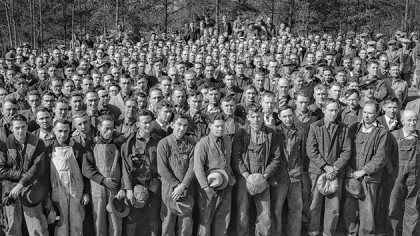Imbolc Valentine Moon
 Just finished reading Strangers in their Own Land by Arlie Russell Hochschild. It’s subtitle is: Anger and Mourning on the American Right. I found the book by reading this article, Why We Need Empathy in the Age of Trump. Here’s an excerpt from near the end that points to part of the way forward, according to Hochschild’s research.*
Just finished reading Strangers in their Own Land by Arlie Russell Hochschild. It’s subtitle is: Anger and Mourning on the American Right. I found the book by reading this article, Why We Need Empathy in the Age of Trump. Here’s an excerpt from near the end that points to part of the way forward, according to Hochschild’s research.*
After finishing the book, I’m not so sure there is a way forward for this particular work though I hope I’m wrong.
Here’s why. In my own analysis, shared by many on the left, we failed to address the economic situation of the working class over the last 40 years or so. As a result of that, it was easy for the right to cherry pick them by focusing on so-called “values politics.” Values here meant hot issues like abortion, gay marriage, affirmative action, climate change. By appealing to the baser elements, the fears and anger of the white working class, they were peeled off from their natural political home, the Democratic Party, and inserted, very clumsily, within the big tent of the Republican circus.

What this simplistic analysis (I’m calling myself out here.) misses is the genuine love of God, church and country that the white working class already had. When the Republicans convinced this constituency that they were the party of Christian (right-wing Christian) values and the only party consistently behind a flag-waving form of patriotism, many (most?) of this demographic switched allegiances, some as early as Nixon’s Moral Majority, some later first as Reagan Democrats, then transforming into Tea Party Republicans.
What I missed, and really shouldn’t have since I grew up in this exact milieux, was the sincerity, the authenticity of the religious and patriotic values of working class whites. These values are more important to them than economic self interest and Hochschild’s book makes this very clear. What happened in the late 20th century was a gradual shift away from economic self-interest voting to voting patterns based on cultural values as well.
 The Christian right metaphysics mixed with flag/gun/anti-government passions, honestly held and sincerely believed, makes allying with secular globalists like myself and everyone else in the progressive movement seem most unlikely. I don’t like seeing it this way. It makes me sad and a bit fearful for the immediate future. Perhaps dialogue can help, but when what Hochschild calls the deep stories are so profoundly different, it means the assumptions with which we start the conversation may defeat the effort at its inception.
The Christian right metaphysics mixed with flag/gun/anti-government passions, honestly held and sincerely believed, makes allying with secular globalists like myself and everyone else in the progressive movement seem most unlikely. I don’t like seeing it this way. It makes me sad and a bit fearful for the immediate future. Perhaps dialogue can help, but when what Hochschild calls the deep stories are so profoundly different, it means the assumptions with which we start the conversation may defeat the effort at its inception.
It still seems to me, however, that policies aimed at working class, high school education or less, Americans must be advanced. As we resist Trump and his gang of mediocres, we also have to stand for something. That something can be economic justice for those left behind by our educational system, by our economy, by big corporations and by automation. It’s important whether or not it convinces the working class white folks of Tea Party/Trump inclinations to shift allegiances. And I fear it won’t.
Still thinking about this, about what might come next. No real good ideas yet. You got any?
* “In fact, they are very friendly toward Bernie Sanders, these people on the far right. Bernie is standing back and asking some big questions. Now, they’ll say, “He’s a socialist. We’re Americans, we can’t be socialists.” But they sense him as a populist. There are possible connections we can make across class—and perhaps re-connect with people we have lost.
We are not looking at that loss. And we feel morally armed to not look at the reasons for that loss, because we are anti-racist, anti-sexist, and so on. Our moralism—our moral convictions—are getting in the way of really understanding people that are making the Democratic Party a shadow of its former self. I think we need to dig deep. That’s the hard thing. It doesn’t mean giving in to it. It’s just the opposite. It means looking at people who feel alien to you, and understanding how they think.
We have to reach out. We need school-to-school crossovers. We need church-to-church crossovers, union crossovers—people on different sides of the political divide learning to listen, and turning their own moral alarm system off, for a little while. They don’t need to turn into somebody else. It’s just listening, and getting smart about what you’ve learned.”
